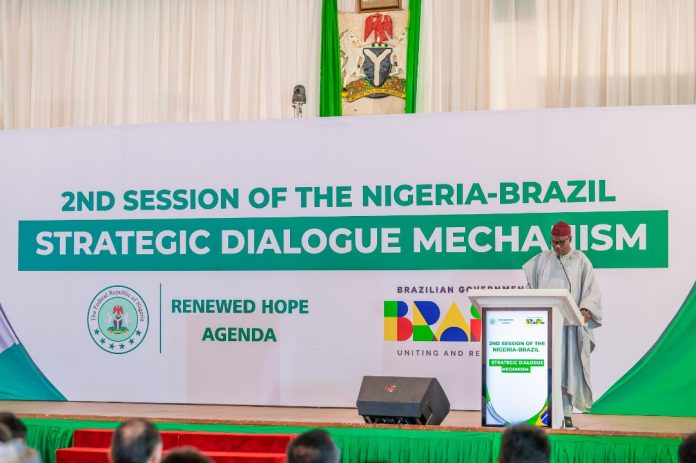Nigeria is seeking to deepen health sector collaboration with Brazil as part of a broader strategy to achieve Universal Health Coverage (UHC), expand local pharmaceutical production, and reform its healthcare system under President Bola Ahmed Tinubu’s Renewed Hope Agenda.
This was the focus of discussions at the 2nd Session of the Nigeria–Brazil Strategic Dialogue Mechanism held Tuesday in Abuja, where the Minister of State for Health and Social Welfare, Dr. Iziaq Adekunle Salako, outlined Nigeria’s ambitious health reform agenda and proposed a new bilateral framework to drive progress.
“President Tinubu’s administration is committed to prioritizing health through increased investments and strategic policies,” Salako said. “With a 52% rise in health budget over two years and 21 policy reforms, we are laying the foundation for a resilient and inclusive health system.”
Salako emphasized the need to learn from Brazil’s Sistema Único de Saúde (SUS) a globally lauded public healthcare model that delivers free services to over 70% of Brazilians and has contributed to a 77% decline in infant mortality since 1990.
“Brazil’s achievements in public health, generic drug legislation, and pharmaceutical production provide valuable lessons as we work to unlock our healthcare value chain and expand access to care,” he said.
Nigeria’s Key Health Sector Gains (Q1 2025):
Primary Health Reach: Over 37 million Nigerians served.
Workforce Expansion: Reduced hiring delays, increased capacity through task-shifting and training.
Health Insurance Growth: Coverage up by over 15% in one year, with new packages for vulnerable groups.
Basic Health Care Provision Fund (BHCPF) Reform: Improved transparency and timely disbursements.
Pharmaceutical Boost: 87 local manufacturers now benefit from incentives under the Presidential Value Chain Initiative.
WHO Recognition: Two Nigerian-made medicines received WHO prequalification — the first in West and Central Africa.
Hospital Projects: 12 new tertiary hospitals and over 500 projects across 61 institutions, including six new cancer centres.
Digital Innovation: Launch of the Nigerian Digital in Health Initiative.
Preventive Health: Rollout of HPV and malaria vaccines, and renewed cervical cancer elimination efforts.
Salako described the NASENI–Troment Biotechnology Factory as a success story in local manufacturing and called for deeper cooperation with Brazil in joint pharmaceutical ventures, vaccine production, research, and health workforce development.
Proposed Nigeria–Brazil Health Collaboration Areas:
Joint Ventures: In pharmaceuticals and vaccine manufacturing.
Research and Innovation: On infectious and non-communicable diseases.
Training Exchanges: Capacity building for Nigerian health professionals.
Disease Surveillance: Leveraging Brazil’s expertise in vector control and public health response.
Policy Framework: Creation of a Nigeria–Brazil Health Cooperation Framework and a Five-Year Joint Action Plan.
The Minister expressed optimism that ongoing engagements with Brazilian officials, including the Vice President’s visit, would lead to a formal partnership that advances healthcare delivery in both countries.
“We are confident that this partnership, backed by political will and a shared vision, will deliver long-term benefits for the people of Nigeria and Brazil, and contribute meaningfully to global health equity,” Salako concluded.
The Federal Ministry of Health and Social Welfare says it views this collaboration as a key driver in achieving Nigeria’s goal of building a strong, resilient, and self-reliant health system by 2030.

